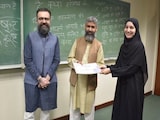Global Handwashing Day, which takes place on October 15, is a day of campaigning throughout the world intended to raise public awareness of the value of using soap and water to wash hands to prevent disease and save lives.
The Global Handwashing Association established Global Handwashing Day as a chance to develop and put into practice original strategies for inspiring people to cleanse their hands using soap, particularly in times of need.
In 2008, the inaugural Global Handwashing Day was observed. Since then, this national holiday has been utilised to raise awareness of the need of having clean hands among both local and national officials and influencers. This is an extremely important message, hand washing is such a basic habit, yet it can actually change everything and save lives.
Global Handwashing Day keeps expanding. Schools, governments, international organisations, private businesses, civil society groups, and more support it. Let's also understand what makes washing hands such an important issue.
Why is washing hands important?
One of the easy habits that can actually protect you and your dear ones from a variety of illnesses is washing your hands. During the course of the day at work, many germs are accumulated in our fingernails, nail beds, and between our fingers. Numerous illnesses are caused by these bacteria because they multiply and are consumed.
Contact with an infected individual can result in the transmission of a variety of infectious illnesses, including COVID-19 infections and respiratory and gastrointestinal infections. The proper use of soap and water for handwashing eliminates and destroys germs from our hands and stops the spread of germs from one person to another.
The bacteria and pathogens that cause sickness are eliminated from our hands by hand sanitizers. When we unintentionally touch our eyes, nose, or mouth with contaminated hands, the disease-causing bacteria can spread from infected individuals or from contacting the infected surface.
Both healthy individuals and those with compromised immune systems can avoid diseases by properly washing their hands under running water and soap. You may avoid respiratory illnesses like pneumonia and gastrointestinal infections that cause diarrhoea by washing your hands often. For certain people, including older adults, persons with compromised immune systems, infants, and children, many of these illnesses can be deadly. Even if you are healthy, you can spread these infections.
How to wash your hands correctly?
It has been shown that washing your hands with soap and water reduces more germs than rinsing with water only. Outside of healthcare settings, using antibacterial soap every day at home may not be essential. Simple soap and water can work well.
Here are the steps you should follow when washing your hands:
1. Wash your hands in running water to your preferred temperature. Cold water and warm water both effectively destroy bacteria.
2. Use the soap that you choose to use. Try using liquid soaps, foaming soaps, and soaps with additional moisturisers.
3. Create a lather for at least 30 seconds. Spread the soapy mixture all over your hands and wrists, in between your fingers and beneath your fingernails.
4. Thoroughly rinse and let it air dry.
5. When leaving a public restroom, turn the faucet off and turn the door handle with a paper towel.
Keep these things in mind next time you are procrastinating following a proper hand wash routine.
Disclaimer: This content including advice provides generic information only. It is in no way a substitute for a qualified medical opinion. Always consult a specialist or your own doctor for more information. NDTV does not claim responsibility for this information.















